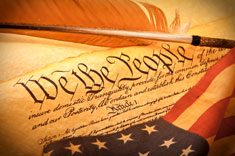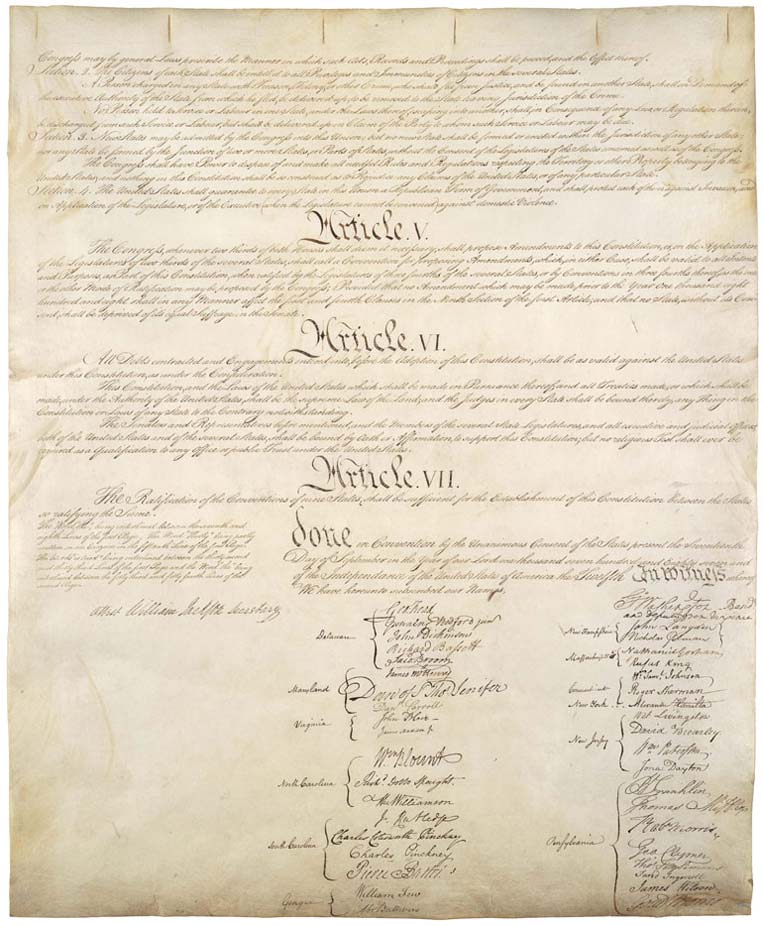| United States Constitution | |
|---|---|
 |
|
| The U.S. Constitution | |
| Preamble | |
| Articles of the Constitution | |
| I ‣ II ‣ III ‣ IV ‣ V ‣ VI ‣ VII | |
| Amendments to the Constitution | |
| Bill of Rights | |
| I ‣ II ‣ III ‣ IV ‣ V ‣ VI ‣ VII ‣ VIII ‣ IX ‣ X | |
| Additional Amendments | |
| XI ‣ XII ‣ XIII ‣ XIV ‣ XV ‣ XVI ‣ XVII ‣ XVIII ‣ XIX ‣ XX ‣ XXI ‣ XXII ‣ XXIII ‣ XXIV ‣ XXV ‣ XXVI ‣ XXVII | |
| View the Full Text | |
| Original Constitution | |
| Bill of Rights | |
| Additional Amendments |
Article 4 of the Constitution is the article that details the states of the United States of America. The article discusses what the responsibilities are, and what duties the states have. The article also discusses the role of the federal government, and what the responsibilities are on that front. This article is broken down in to 4 distinct sections, and these are further broken down in to the different clauses under each section and each power.
Section 1: Each State to Honor all Others
This is the Full Faith and Credit Clause. The clause details that each state is required to extend credit and extend full faith to the public acts, to any court proceedings, and to the other states in the U.S. The section further breaks down the fact that Congress has the power to watch over this and step in if these things are not taking place.
Section 2: State Citizens, Extradition
This section dictates what the responsibilities of the states are in relation to the locals, as well as in relation to one another, based on a series of events that might take place in the states. It gives guidelines on how to govern the people, and how to deal with neighboring states.
Clause 1
This is the Privileges and Immunities clause, which dictates the state must protect immunities and what the privileges are between the states.
Clause 2
 This is the Extradition clause, stating that any individual that is charged with a crime, and who tries to escape to another state, can be forced by government officials (in either state), to return to the state they were charged in.
This is the Extradition clause, stating that any individual that is charged with a crime, and who tries to escape to another state, can be forced by government officials (in either state), to return to the state they were charged in.
Clause 3
The Fugitive Slave clause first took effect during the period of slavery in the U.S. If slaves ran away from the state they were from, they would in turn have to be brought back, allowing the owner to claim that slave. With the passing of the 13th Amendment, this clause is no longer viable in the Constitution.
Section 3: New States
This section deals with federal property. It also deals with any new states that might be accepted in to the union as a U.S. state. It dictates what kind of powers that state has as well as what powers the elected officials in that new state will have.
Clause 1
This clause states that Congress has the power to admit new states in to the union. But, it limits the fact that new states cannot be formed by combining a number of states that are already in existence in the union. In order for this to occur, Congress would have to get permission from the legislature in each of the separate states that it would like to combine to create a new state.
Clause 2
This is known as the Territorial Clause, and is sometimes called the property clause. This clause gives the U.S. Congress the final power over any territory in the country. The clause also gives Congress the power to remove certain territories. Lastly, it gives Congress the power to create laws over the territories that they are governing.
Section 4: Republican Government
This final section of Article 4 of the Constitution dictates what obligations the United States has as a country.
Clause 1
This is known as the Guarantee Clause. This clause states that the Federal government in the U.S. have an obligation to guarantee each of the 50 states a government, and this government is a republic. Basically, it gives each state their own choice as to how to run and operate the state, and gives state officials the power to create laws, rules, and regulations, unless there is already a federal law in place dealing with certain issues, which would then trump the state law being created.
Clause 2
The second clause protects the states against domestic violence, and it protects the states against invasion.
Depending on certain emergencies and exigent factors coming in to play, the federal government always has some kind of power to interfere with state power and the way that state officials govern their state. However, Article 4 of the Constitution is one that provides the states with certain powers that were not available to them prior to the Constitution being written. States were solely controlled by federal government, and each state had to abide by certain rules and had no say as to how it would govern its people.